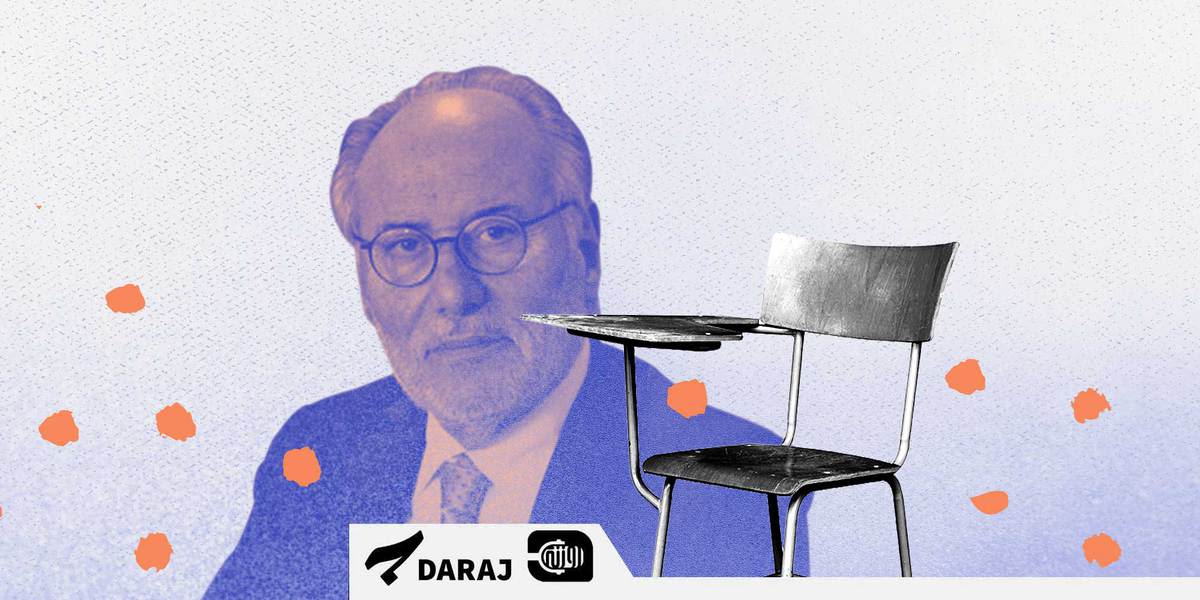
In 2022, Students Learn in Camps as Schools Are Closed!
Pascal Soma
My salary doesn’t cover transportation is how Mirna, a Lebanese public school Arabic language teacher, sums up the suffering of the teachers that are still on a strike.
Nancy, a science teacher at the afternoon shift dedicated to Syrian students, agrees with Mirna. “We were promised that the donors would give us 130 USD a month, and 100 thousand Lebanese pounds per hour.
Every time, there’s a new promise. But, in the end, we are given nothing. All promises made by the Ministry of Education are untruthful and deceitful,” she said.
But it didn’t end there. It seems like the authorities want to make it look like a problem between Syrian students and teachers, after a viral video showing teachers kicking out Syrian students in front of a school in Hermel that’s located in the northern part of Beqaa Valley.
“Tell the United Nations that you have no place in our schools. It’s not acceptable that our children would stay at home, while you finish your education,” with these words, female teachers that have been on a strike kicked out Syrian students.
The unjustified behavior came after contract public school teachers announced a general strike. The strike was a response to the “daily five-dollar incentive” announced by caretaker minister of education Abbas al-Halabi, which was described as an “insult” and was later taken back.
After public school teachers announced a general strike until there’s an improvement of their living conditions, the minister of education closed the non-Lebanese afternoon classes for equality purposes.
Racist, discriminative, and arbitrary decisions are once again made by Lebanese authorities. Such decisions threaten the students’ inherent right to education. Syrian students are the ones that pay the highest price.
Instead of finding a real solution to the problem, they go for inhumane practices. The suffering of public school teachers going on a strike, and the closure of afternoon classes, is met by the suffering of students; their low-income families; or the refugees that are considered to be the poorest. Schools are closed until further notice, or until there’s an increase in salaries and incentives.
Students in Labor Market, Out of School
There’re more than 170 thousand refugees registered in nearly 350 Lebanese public schools (in the afternoon classes), while there are 235 thousand Lebanese students.
Half the Syrian children, according to UNICEF, are out of schools ـــــbe it in Syria, or in refugee countries. According to the Spokesperson for the UN Refugee Agency in Lebanon, Lisa Abou Khaled, 30% of Syrian children inside Lebanon have never been to school; and primary school attendance dropped by 21% in 2022 alone.
The Vulnerability Assessment of Syrian Refugees, jointly issued by the United Nations High Commissioner for Refugees (UNHCR); the United Nations World Food Programme (WFP); and the UNICEF, shows that the number of Syrian refugee children who are engaged in child labor had doubled between 2019 and 2012 to reach 82527 children ـــــ with boys being at a higher risk.
Partners of UNICEF reported that many children under the age of 6 work on streets and farms, which puts them at risk of being seriously burned or even dying. Furthermore, they can be subject to other threats like abuse; violence, and sexual exploitation.
Rozana talked to some Syrian parents, and they all said almost the same thing: living conditions get in the way of their children’s education. “School is far from the camp, and the cost of transportation is high,” father of five children Muhammad said. “If one wants to buy a pen and a notebook, they’d need a budget. Nevertheless, I’d borrow money to secure the minimum amount. But now school doors are closed, as are all the doors of life.” he expressed. “My oldest son is very smart, and he wants to become a doctor. I am concerned that I might not be able to help him achieve his dream”.
Model Camps
“I was in a camp a few months ago, and I was surprised to find a 13-year-old boy that couldn’t write his name”.
“That’s when I decided to raise money for building model camps, with teachers from different disciplines. We started with one, and now there are five for teaching children in northern Lebanon. So far, 150 students are registered,” Syrian activist Khedr al-Dabi tells us about his initiative to fight illiteracy and provide education.
"I am trying to do my best to help those innocent children. They have the right to learn and achieve their dreams,” he adds. Al-Dabi tells Rozana that he’s excited that students are getting ahead, gaining knowledge, and learning new skills.
The story of Khedr, who’s also filming children in camps and documenting their stories and laughs, is a glimmer of hope amid this heavy gloom. However, one local individual initiative that’s financially and geographically limited is not enough to deal with the prolonged issue. Radical and real solutions are needed to protect children from all forms of discrimination, so that schools would be an inherent right to any child.
